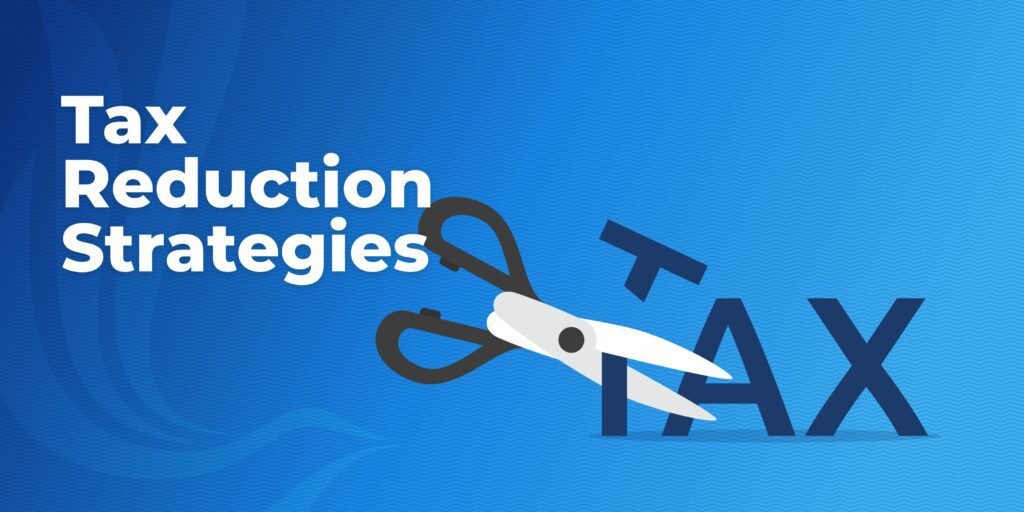Are you tired of feeling like your hard-earned wealth is slipping away due to inefficient tax planning? It’s time to take control of your financial future by implementing strategic tax planning strategies.
By doing so, you can unlock your wealth and achieve sustainable growth. In this post, we’ll explore the importance of strategic tax planning, discuss ways to maximize tax efficiency, and provide actionable tips for minimizing tax liabilities and achieving long-term financial goals.
Whether you’re looking to build wealth or simply secure a brighter financial future, this guide has got you covered.

Understanding the Importance of Strategic Tax Planning
Strategic tax planning is a crucial component of wealth building, allowing individuals to optimize their financial strategy and achieve their long-term goals.
By combining tax planning with financial planning, individuals can create a comprehensive plan that addresses their financial needs and aspirations. This approach enables individuals to reduce their tax liability, increase their wealth, and build a secure financial future.
Without a strategic tax plan, individuals may be leaving money on the table and missing opportunities to grow their wealth. By understanding the importance of strategic tax planning, individuals can take control of their financial future and make informed decisions that drive their success.
Maximizing Tax Efficiency for Wealth Building

Maximizing tax efficiency is crucial for building wealth. By optimizing income streams, utilizing tax-deferred savings vehicles, and structuring investments to minimize tax implications, individuals can reduce their tax liability and increase their wealth.
For instance, utilizing tax-loss harvesting strategies can help offset capital gains, while charitable giving can provide tax deductions. Additionally, considering geographic location and tax implications of investments can also help maximize tax efficiency.
By taking a proactive approach to tax efficiency, individuals can build a strong foundation for their financial success and achieve their long-term goals.
Diversifying Investment Strategies for Tax Efficiency
A crucial element in strategic tax planning is diversifying your investments to minimize potential tax burdens. By spreading investments across various asset classes, such as stocks, bonds, real estate, and tax-advantaged accounts, you can benefit from a range of tax treatments. Tax-advantaged accounts like IRAs and 401(k)s allow you to defer taxes on contributions and earnings until you withdraw the funds, which can significantly enhance your wealth growth over time.
Equally important is the diversification of income types. For example, combining dividends, capital gains, and interest income in your portfolio allows you to optimize tax efficiency. Dividends may be taxed at lower rates, depending on the type, while long-term capital gains are often taxed more favorably than ordinary income. Understanding these nuances and constructing a portfolio that leverages these tax advantages can help reduce your tax liabilities.
Moreover, international diversification could provide opportunities for tax savings, depending on the tax treaties and regulations in place between your home country and the countries where you invest. This strategy is especially beneficial for high-net-worth individuals who are looking to manage and potentially reduce their overall tax exposure.
Strategies for Minimizing Tax Liabilities
Minimizing tax liabilities requires a comprehensive approach that involves utilizing tax credits and deductions, optimizing charitable giving, and taking advantage of tax-loss harvesting opportunities.
Taxpayers can also consider geographic location and tax implications of investments to minimize liabilities. Additionally, staying informed about tax changes and updates can help individuals take advantage of new tax savings opportunities.
By implementing these strategies, individuals can reduce their tax burden and increase their wealth. For instance, utilizing tax credits and deductions can help offset income tax, while charitable giving can provide tax deductions.
By taking a proactive approach to minimizing tax liabilities, individuals can achieve greater financial security and build a stronger financial future.
The Role of Estate Planning in Tax Efficiency
Estate planning is an essential aspect of strategic tax planning. It involves preparing for the transfer of your wealth in a way that minimizes tax liabilities, ensuring that your heirs can inherit as much as possible. Proper estate planning allows you to leverage tools like trusts, gifting strategies, and charitable donations to reduce estate and inheritance taxes.
One of the most effective estate planning strategies is setting up a revocable living trust. This allows your assets to be transferred to your heirs without the need for probate, which can save time and money. Additionally, you can make use of annual gift exclusions, which enable you to gift a certain amount of money to your heirs each year without incurring gift taxes.
Charitable giving is another vital tool in estate planning. Donating assets to a charity not only supports a cause close to your heart but also offers tax deductions. When structured properly, charitable donations can help reduce the size of your taxable estate, lowering your potential estate tax liabilities.
By proactively planning your estate, you can ensure that your wealth is distributed according to your wishes, while also minimizing the tax burden on your heirs.
The Role of Tax Planning in Achieving Long-Term Financial Goals

Tax planning plays a crucial role in achieving long-term financial goals. It helps individuals optimize their financial strategy by minimizing tax liabilities and maximizing tax efficiency.
By integrating tax planning with financial planning, individuals can create a comprehensive plan that addresses their financial needs and aspirations. For instance, identifying tax-efficient investment opportunities, optimizing income streams, and structuring assets to minimize tax implications can help individuals achieve their long-term goals.
Additionally, considering the impact of tax reform on long-term financial goals and adjusting strategies accordingly can also help individuals achieve their goals.
By taking a proactive approach to tax planning, individuals can build a strong foundation for their financial success and achieve their long-term goals.
The Importance of Professional Advice in Tax Planning
While many of these tax strategies can be implemented independently, it’s often wise to seek professional advice when navigating complex tax laws. Tax professionals, such as certified public accountants (CPAs) and financial planners, have specialized knowledge and experience that can help you develop a comprehensive tax plan tailored to your unique financial situation.
By working with a professional, you can ensure that you’re taking full advantage of available tax deductions, credits, and strategies. They can also help you navigate changes in tax laws and regulations, ensuring that your tax plan remains up to date and effective.
Tax Strategies for Small Business Owners
For small business owners, strategic tax planning is especially important, as it can have a direct impact on both personal and business finances. Taking advantage of tax deductions and credits specifically available to business owners can help you maximize tax efficiency and increase profitability.
One key strategy is to optimize your business structure. Whether you operate as a sole proprietorship, partnership, S-corporation, or LLC, each structure has different tax implications. For example, S-corporations allow business owners to avoid self-employment taxes on distributions, which can lead to significant savings.
Additionally, small business owners can take advantage of deductions for business expenses, including home office costs, employee benefits, and vehicle expenses. For instance, if you use your car for business purposes, you may be able to deduct a portion of the costs, such as fuel, maintenance, and insurance.
Investing in retirement plans for your business, such as a Simplified Employee Pension (SEP) IRA or a 401(k), can also provide substantial tax savings. Contributions to these plans are tax-deferred, reducing your current taxable income while preparing for retirement.
By taking the time to understand the tax benefits and strategies available to small business owners, you can optimize your business’s financial performance and minimize tax liabilities.
The Impact of Tax Reform on Wealth Building
The Impact of Tax Reform on Wealth Building can be significant. The changes to tax laws and regulations can affect an individual’s financial strategy, requiring adjustments to optimize their tax position.
For instance, identifying new tax savings opportunities, optimizing income streams, and restructuring assets to minimize tax implications can help individuals take advantage of tax reform.
Additionally, considering the impact of tax reform on wealth building and adjusting strategies accordingly can also help individuals build a stronger financial future.
By staying informed about tax changes and updates, individuals can adapt their financial strategy to maximize their wealth and achieve their long-term financial goals.
Tax Efficiency in Real Estate Investments
Real estate can be an excellent investment vehicle, offering both income and capital appreciation. However, the tax implications of real estate investments can be complex, making tax-efficient planning essential for maximizing wealth in this sector.
One of the most significant tax advantages in real estate is depreciation. Depreciation allows you to deduct a portion of the cost of your property over time, which can offset rental income and reduce your overall tax liability. Additionally, 1031 Exchanges allow you to defer capital gains taxes when selling a property and reinvesting the proceeds into another like-kind property.
Real estate investors can also benefit from tax deductions related to mortgage interest, property management fees, and maintenance costs. By strategically managing these deductions, investors can reduce their taxable income and increase their wealth-building potential.
Tax-Advantaged Retirement Accounts: A Key Wealth Building Tool
One of the most effective ways to build wealth over time is by contributing to tax-advantaged retirement accounts. These accounts offer significant tax benefits, including tax-deferred growth and, in some cases, immediate tax deductions.
Traditional IRAs and 401(k)s are two of the most well-known tax-deferred retirement accounts. Contributions to these accounts reduce your taxable income for the year in which you make the contribution, allowing you to lower your current tax burden. The earnings within these accounts grow tax-deferred until you begin making withdrawals in retirement, at which point they are taxed as ordinary income.
Roth IRAs and Roth 401(k)s, on the other hand, provide tax-free growth. Contributions are made with after-tax dollars, meaning you won’t receive an immediate tax deduction, but your withdrawals in retirement will be tax-free.
By strategically contributing to these accounts and taking advantage of the tax benefits they provide, you can build wealth while minimizing your tax liabilities.
Navigating State and Local Taxes
When planning your tax strategy, it’s essential to consider not only federal taxes but also state and local tax regulations. State and local taxes can vary significantly depending on where you live and do business, and they can have a substantial impact on your wealth-building strategy.
For example, some states have no income tax, while others impose high state income taxes. If you reside in a state with high income taxes, it may be worth considering relocating to a state with more favorable tax rates. Additionally, certain states offer tax incentives for businesses or investors, which could benefit your financial strategy.
Local taxes, including property taxes and sales taxes, also play a significant role in your overall tax burden. By understanding the local tax laws in your area and seeking out tax-saving opportunities, you can reduce your overall tax exposure.
Incorporating state and local tax considerations into your broader financial plan can help you make more informed decisions that maximize your wealth while minimizing tax liabilities.
Advanced Tax Strategies for High Net-Worth Individuals
High-net-worth individuals face a unique set of challenges when it comes to tax planning. Because of their substantial wealth, they are often subject to higher tax rates and more complex tax laws. Therefore, it is essential to implement advanced tax strategies to minimize liabilities and preserve wealth.
One such strategy is the use of tax-deferred investment vehicles like the 1031 Exchange in real estate. This allows you to defer capital gains taxes when selling an investment property, as long as you reinvest the proceeds into a similar property. This strategy can significantly reduce your tax bill and allow you to continue growing your wealth without immediate tax consequences.
Additionally, high-net-worth individuals often make use of family limited partnerships (FLPs) and grantor-retained annuity trusts (GRATs). These vehicles allow you to transfer assets to heirs while minimizing gift and estate taxes. An FLP can provide significant tax benefits by allowing you to give away ownership in a business or property, while retaining control of the assets.
By employing a combination of these advanced strategies, high-net-worth individuals can effectively manage their tax exposure and ensure that their wealth continues to grow for future generations.
Conclusion: Building Wealth through Strategic Tax Planning

In 2025, strategic tax planning will be vital for building wealth. By optimizing tax efficiency, minimizing liabilities, and utilizing tax-advantaged retirement accounts, you can create a solid financial foundation. Diversifying investments and managing taxes on real estate and businesses further boost your wealth over time.
Adapting to tax changes and integrating advanced strategies like trusts and international investments help protect and grow wealth. Working with financial professionals offers tailored solutions to maximize tax benefits, reducing liabilities and seizing overlooked opportunities.
Tax planning should be part of your long-term financial strategy. Aligning financial goals with tax planning ensures greater financial security and wealth growth, while minimizing surprises. Informed decisions lead to a more prosperous future.
FAQ – Frequently Asked Questions about Strategic Tax Planning
What is the importance of strategic tax planning?
Strategic tax planning is crucial for building wealth and achieving long-term financial goals. It helps individuals minimize tax liabilities and maximize tax efficiency, ensuring they have more money to invest and grow their wealth.
How can I minimize my tax liabilities?
Minimizing tax liabilities requires a comprehensive approach that involves utilizing tax credits and deductions, optimizing charitable giving, and taking advantage of tax-loss harvesting opportunities. Staying informed about tax changes and updates can also help individuals take advantage of new tax savings opportunities.
What role does tax planning play in achieving long-term financial goals?
Tax planning plays a critical role in achieving long-term financial goals. By integrating tax planning with financial planning, individuals can create a comprehensive plan that addresses their financial needs and aspirations. This helps ensure they are optimizing their financial strategy and achieving their long-term goals.
How does tax reform impact wealth building?
Tax reform can have a significant impact on wealth building. The changes to tax laws and regulations can affect an individual’s financial strategy, requiring adjustments to optimize their tax position. By staying informed about tax changes and updates, individuals can adapt their financial strategy to maximize their wealth and achieve their long-term financial goals.
What are the benefits of strategic tax planning?
Strategic tax planning offers numerous benefits, including minimizing tax liabilities, maximizing tax efficiency, and ensuring individuals have more money to invest and grow their wealth. By taking a proactive approach to tax planning, individuals can build a strong foundation for their financial success.
Source: Reuters – Finance | Related articles: X – Twitter / Quora




